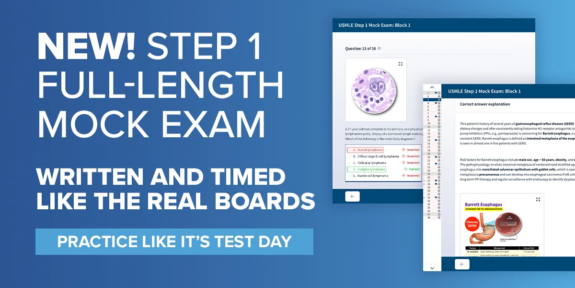For an international medical graduate (IMG) planning on practicing in the US, the USMLEs (United States Medical Licensing Examinations) are a big part of any US residency application. The USMLE Step exams (or their COMLEX equivalents) are designed to assess a physician’s ability to apply medical knowledge, concepts, and principles to patient care. They’re a requirement for physicians seeking licensure to practice medicine in the US.
In this post, I’m going to share key information IMGs need to have about the USMLEs, so you can get into the US residency of your choice! Let’s start by reviewing some basic information about the Step exams, and then we’ll dive into some tips for taking them.

Preparing for USMLE Step 1 as an IMG? We’re here to help! Take a Step 1 mock exam to simulate exactly what test day will be like, and get a score report to help you understand what you need to work in on order to pass.
All About the USMLE Exams for IMGs
There are three Step exams:
Step 1
Step 1 assesses a medical student’s understanding and application of basic science concepts relevant to the practice of medicine. It covers topics such as anatomy, physiology, biochemistry, pharmacology, pathology, and microbiology. For US medical students, Step 1 is typically taken after the second year of medical school.
Step 1 scores used to be a pivotal part of a residency application, but the exam is now pass/fail.
Step 2
Step 2 is meant to evaluate a student’s clinical knowledge and decision-making skills in the context of patient care. This exam includes questions based on clinical scenarios and requires you to solve problems, including the diagnosis and management of common and esoteric diseases.
Step 3
Step 3 is the final component of the USMLE series. It assesses whether medical school graduates or physicians with prior training can apply what they’ve learned. It tests your ability to diagnose and manage common clinical conditions across the various medical specialties, meaning you must prepare for questions ranging from cardiology to otolaryngology in both the ambulatory or hospital settings.
USMLE Administration for IMGs
Each USMLE exam is administered by the National Board of Medical Examiners (NBME) and the Federation of State Medical Boards (FSMB). The exams are computer-based and hosted at designated testing centers across the United States and select international locations. The exams typically last around eight hours. You should plan to spend your entire day at the testing site.
IMGs, USMLEs, and Residency
For IMGs, successfully passing the USMLE Step 1 and scoring well on Steps 2 and 3 are critical steps (pun intended) to obtaining a coveted residency spot in the US.
The good news for IMGs is that the USMLE Step exams act as equalizers, giving many IMGs a fair shot at residency training in the United States. You take the same exam as everyone else. You have the same questions, time limit, and take it under the same conditions.
Therefore, you can give yourself the best chance at gaining entrance into the US medical system by scoring well. By doing so, you let residency program directors know that you’re a capable candidate for their program and are well prepared for what residency training has to offer.
Navigating the US medical residency application process can be a challenge for IMGs unfamiliar with the ERAS application and system. On top of that, you’ll need to research IMG-friendly programs and match requirements from various visas (J-1 or H-1B) to ECFMG (Educational Commission for Foreign Medical Graduates) certification.
How do IMGs qualify to take USMLE exams?
To apply, visit the USMLE website and you’ll find two links. You can either apply through the NBME (National Board of Medical Examiners) if you’re a current US/Canadian student or recent graduate of LCME or COCA accredited medical programs.
Or, for students/graduates of medical schools outside of the US and Canada, you apply via ECFMG, which is responsible for verifying your qualifications. You must first become ECFMG-certified in order to register for the USMLE exams.
For more information, check out this guide, How to Register for Your First USMLE as an IMG!
9 Tips and Tricks for IMGs Taking the USMLEs!
Brief background: I’ve worked with hundreds of US medical students and IMGs over the past few years and I’ve picked up some USMLE pearls along the way. Allow me to share them with you.
Here’s nine things that’ll help IMGs excel on USMLE exams.
1. Understand the exam structure and question format.
Before diving into preparation, it’s crucial to understand the structure and content of each USMLE exam. Check out the content specifications so you know what you’re up against for each exam, starting with Step 1.
The content outline literally tells you everything that’ll be on the exam. In fact, it even offers a percentage point breakdown of the topics that the exam will cover.
Familiarize yourself with the format, timing, and content of each exam to develop a targeted study plan. Check out our mock exam in order to familiarize yourself with multiple-choice question (MCQ) standardized exams.
This can be especially useful for international medical graduates from countries where MCQ formats are not used as often, such as in many European medical schools, where much of the testing content is given via oral lectures and tested via written exams and oral discussions.
The mock exam is useful to simulate time constraints and other exam day challenges. A notable difference seen with MCQ format standardized exams such as USMLE Step 1 is the questions posed can have various tempting answer choices that may seem correct. These red herrings are a bane, and can cause you to doubt and alter your original answer selection, which is often the correct choice.
2. Know the timeline of the exam.
The USMLE Step exams are taken in sequential order, with Step 1 often taken by US medical students during or upon completion of their second year of medical school. Step 2 is usually taken after rotations and Step 3 can be taken after graduating from medical school.
IMGs are not on the same timeline. In fact, many IMGs are already practicing physicians in their home country as they prepare to take Step 1. This creates many challenges, as Step 1 has a lot of subject matter that’s preclinical. You’d do well to review subject matter such as biochemistry, biostatistics, and pharmacology from your time as a medical student.
3. Recognize the differences in medical education systems.
IMGs often come from countries with different medical education systems compared to the United States. The content, emphasis, and depth of knowledge may vary, which can make it harder for IMGs to adapt to the USMLE format. Furthermore, the correct answer on a USMLE exam may not be how an IMG is used to practicing medicine in their home country.
To help rectify these issues, talk to students from your medical school or home country who’ve already taken the USMLE, or even better, have excelled on the Step exams and matched into a US residency program.
Ask about the resources they found useful, anything they would do to study or prepare differently, and about their exam process in general. Don’t be afraid to reach out to your medical school’s student affairs office for contacts or USMLE study resources.
Internationally, many academic medical institutions have begun to offer USMLE study resources or even courses for those who are interested in the exam. This has been popular in Caribbean schools but has now expanded to medical schools worldwide. Not all schools will have this, of course, but it’s worth checking with yours.
4. Realize that everyone is taking the same exam.
I have worked with, advised, and tutored a few dozen IMGs when it comes to USMLE Step studying, board exam preparation, and residency counseling. I tell each of them the same thing: that they’re taking the same test as US medical students.
So yes, while the education from courses in school to clinical experiences are different, ultimately they’re graded on the same standards as everyone else. The same rules for preparation apply and if you study properly, you have the chance at a killer score.I enjoy working with IMGs because they come from such varied backgrounds and have unique stories.
Regardless of whether you’re a practicing attending physician abroad with hospital responsibilities, or if you’re still a student on clinical duty, starting the USMLE prep early enables you to cover all necessary topics thoroughly and reduces the stress associated with last-minute cramming, in addition to allowing you time for your current tasks.
Get started now with Blueprint’s Med School Study planner! It’ll set you on the path to success!
Also, invest in reputable study materials that are specifically tailored for USMLE preparation. These resources provide comprehensive coverage of exam content. For instance, our Step 1 mock exam is a great way to familiarize yourself with MCQ similar to those found on USMLE Step 1.
5. Focus on understanding concepts.
Don’t rely solely on memorization. Rote recall can be useful for some portions of the exam, but strive to understand the underlying concepts in each subject. Building a strong foundation of knowledge will enable you to apply your understanding to clinical scenarios encountered in the upcoming Step exams and in future medical practice.
Furthermore, deeper knowledge of medical concepts will allow you to recognize patterns and apply your knowledge to various clinical scenarios, which the Step exams often present. The tougher questions will require you to apply your knowledge, rather than simply recall the answer.
Conceptual understanding is better for a variety of reasons. It facilitates long-term retention of information. When you understand the underlying principles, you’re more likely to remember them over time compared to rote memorization, which tends to fade quickly.
Moreover, the exams have questions that often interconnect across different areas of medicine. Understanding these connections helps you answer questions better than simple recall.
6. Practice questions, you gotta just do them!
Practice with a wide variety of USMLE-style questions to familiarize yourself with the exam format and improve your test-taking skills. Utilize question banks, mock exams, and score reports to identify your weak subject areas, allocate extra time to review and master those topics, and see how much progress you make along the way.
Focus on strengthening your understanding in areas where you feel less confident to ensure a well-rounded preparation. You simply cannot avoid practice questions and hope to do well on the USMLE Step exams.
7. Simulate exam conditions.
This tip may seem obvious but it’s often overlooked. Regularly practice under timed conditions to simulate the exam environment, improve time management skills, and build the stamina needed to maintain focus and fight off exam fatigue.
8. English proficiency matters.
The USMLE exams are all administered in English. In fact, to get ECFMG certification (described above), you need to have passed an Occupational English Test (OET) for medicine. Proficiency in English will help you understand exam questions and answer choices.
Furthermore, English proficiency is vital for effective communication with patients, colleagues, and healthcare professionals in the US. As IMGs pursue residency training and eventually practice medicine in the United States, they need to communicate clearly and confidently in English to provide quality patient care and collaborate with multidisciplinary teams.
In addition to patient care, IMGs need to communicate effectively with colleagues, supervisors, and other healthcare professionals. This includes discussing patient cases, collaborating on treatment plans, and presenting findings during rounds or conferences. Clear and concise communication in English is essential for effective teamwork and ensuring patient safety.
Lastly (as if I haven’t harped on this enough) all medical professionals, IMGs included, are required to document patient encounters, medical histories, diagnoses, and treatment plans accurately and comprehensively. Medical documentation must adhere to professional standards and legal requirements, and it often involves writing detailed notes in English. Proficient English skills are necessary to ensure that medical records are clear, concise, and understandable by other healthcare providers.
9. Look at the big picture (aka, your entire residency application).
Prior to applying for a US residency program, review your application in its entirety. The Step scores are just one component, albeit a large one. It’s still important to have your ducks in a row for the remainder of your application, from big-ticket items such as recommendation letters and your personal statement to more nuanced details such as your experiences section and resume.
Final Thoughts
Preparation for all three USMLE exams may seem daunting. The key is to take it one step at a time, and with strategic planning and dedicated preparation, you can achieve a high score even if you didn’t receive medical training in the States.
You don’t believe me? Check out this PDF. The proof is in the pudding!
If you feel like you need a hand with all this, please reach out to us! Whether you want help with USMLE exam prep, assistance understanding the application process, your personal statement, a CV review, or if you just want to talk with someone who has been through it before, consider using one of Blueprint’s tutors or advisors. Reach out for a free consultation. We’re ready to help IMGs crush the USMLEs and land a US residency!
Or, if you’re looking for some extra resources, check out these other posts on the Med School blog!





